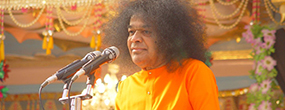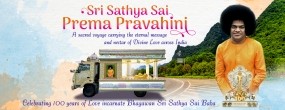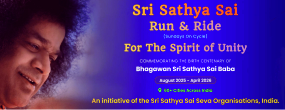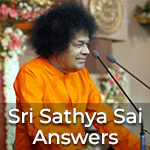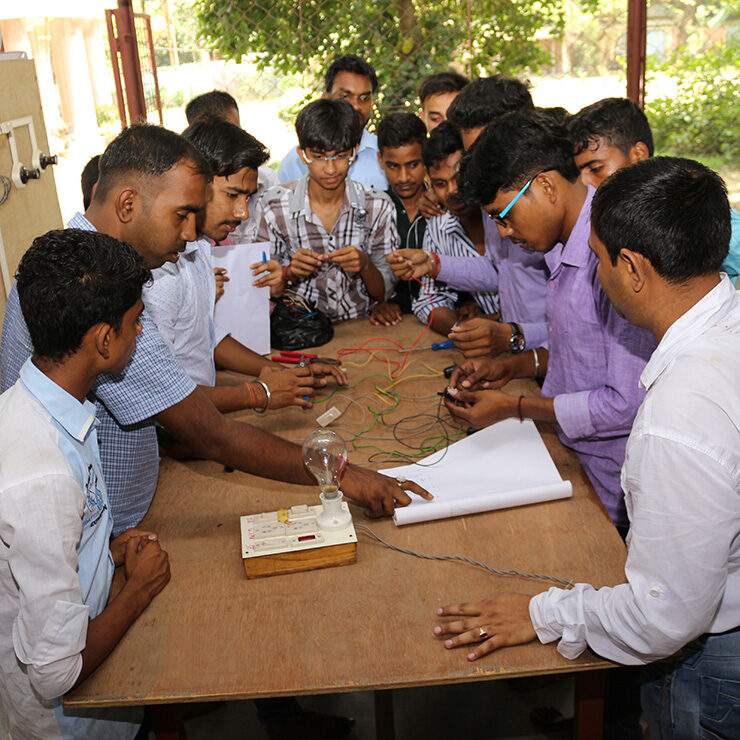Food – the Basic Need
Food is not only the basic human need but also the
fundamental aspect of nature that sustains every life. If
we deeply ponder, it is the foremost of all struggles or
aspirations in one’s life. Only after securing food, does
a man think of fulfilling other needs. Without food, life
becomes impossible; without food, the purpose of
human life is defeated.
Current State
Although nature has provided everything in
abundance, today, the state of affairs concerning the
availability, accessibility, and security of food for all on
an equitable and sufficient basis appears to be a
chronic issue that the world is still grappling with. Food
security and malnutrition are one of the topmost
agendas under the 2030 Agenda for Sustainable
Development adopted by the United Nations Member
States in 2015.
If we glance through the statistics, the gravity of the problem will become more apparent and obvious. The Sustainable Development Goals Report 2022 states that “cascading and interlinked crises are putting the 2030 Agenda for Sustainable Development in grave danger, along with humanity’s very own survival.” (Source: https://unstats.un.org/sdgs/report/2022/).
The Covid 19 Pandemic, resulting in the growing
increase in the food price index has further contributed
to the problem and has jeopardised the achievement
of the goals.
The extract of the infographic (on the right) on the
SDG-2: Zero Hunger – ‘End hunger, achieve food
security and improved nutrition and promote
sustainable agriculture’ certainly brings forth a grim
picture of the current state of affairs.

“This year's report should dispel any lingering doubts that the world is moving backwards in its efforts to end hunger, food insecurity and malnutrition in all its forms. We are now only eight years away from 2030, but the distance to reach many of the SDG 2 targets is growing wider each year. There are indeed efforts to make progress towards SDG 2, yet they are proving insufficient in the face of a more challenging and uncertain context. The intensification of the major drivers behind recent food insecurity and malnutrition trends (i.e. conflict, climate extremes and economic shocks) combined with the high cost of nutritious foods and growing inequalities will continue to challenge food security and nutrition. This will be the case until agrifood systems are transformed, become more resilient and are delivering lower cost nutritious foods and affordable healthy diets for all, sustainably and inclusively.
- The State of Food Security and Nutrition in the World – 2022
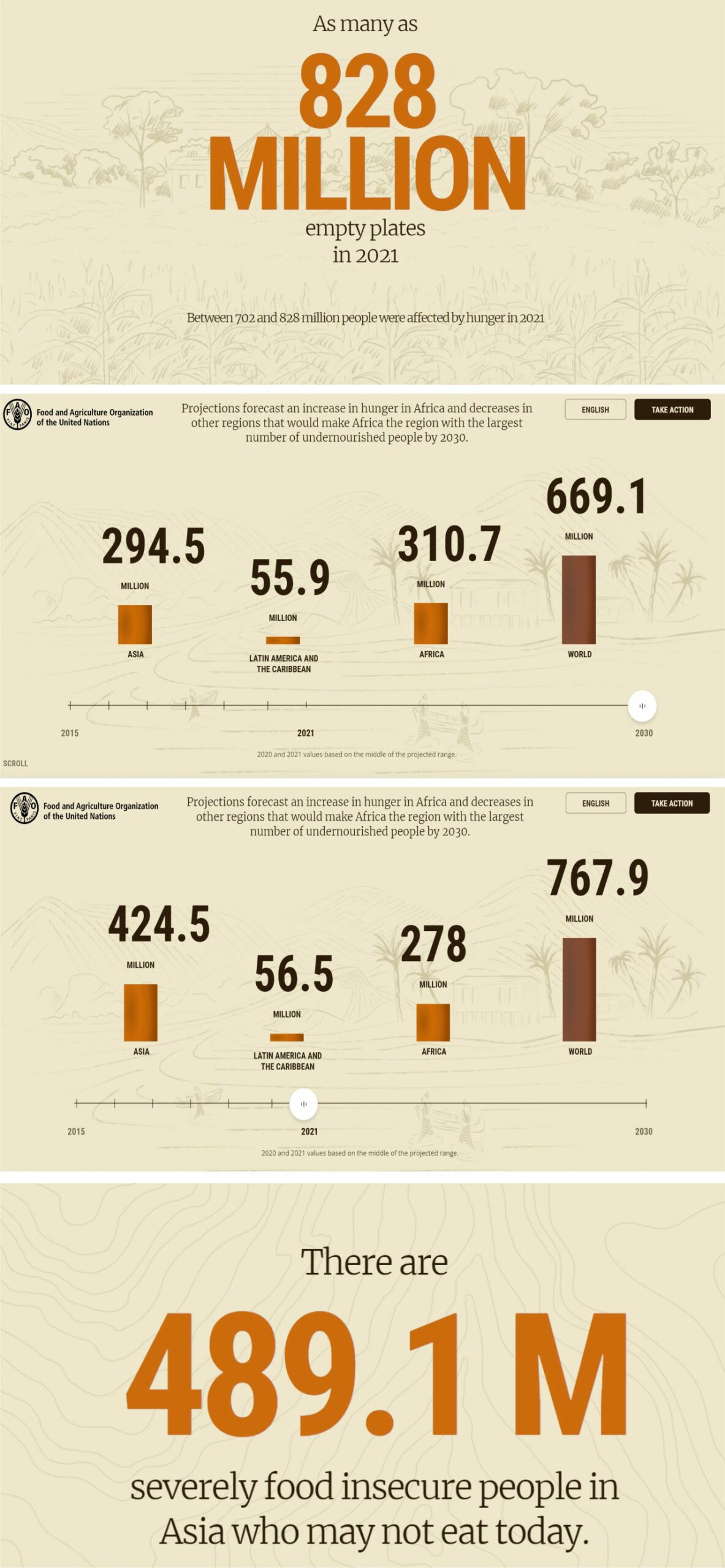
- As many as 828 million people were affected by hunger in 2021 – 46 million people more from a year earlier and 150 million more from 2019.
- After remaining relatively unchanged since 2015, the proportion of people affected by hunger jumped in 2020 and continued to rise in 2021, to 9.8 percent of the world population. This compares with 8 percent in 2019 and 9.3 percent in 2020.
- Around 2.3 billion people in the world (29.3 percent) were moderately or severely food insecure in 2021 – 350 million more compared to before the outbreak of the COVID-19 pandemic. Nearly 924 million people (11.7 percent of the global population) faced food insecurity at severe levels, an increase of 207 million in two years.
- The gender gap in food insecurity continued to rise in 2021 – 31.9 percent of women in the world were moderately or severely food insecure, compared to 27.6 percent of men – a gap of more than 4 percentage points, compared with 3 percentage points in 2020.
- Almost 3.1 billion people could not afford a healthy diet in 2020, up 112 million from 2019, reflecting the effects of inflation in consumer food prices stemming from the economic impacts of the COVID-19 pandemic and the measures put in place to contain it.
- An estimated 45 million children under the age of five were suffering from wasting, the deadliest form of malnutrition, which increases children’s risk of death by up to 12 times. Furthermore, 149 million children under the age of five had stunted growth and development due to a chronic lack of essential nutrients in their diets, while 39 million were overweight.
- Progress is being made on exclusive breastfeeding, with nearly 44 percent of infants under six months of age being exclusively breastfed worldwide in 2020. This is still short of the 50 percent target by 2030. Of great concern, two in three children are not fed the minimum diverse diet they need to grow and develop to their full potential.
Looking forward, projections are that nearly 670 million people (8 percent of the world population) will still be facing hunger in 2030 – even if a global economic recovery is taken into consideration. This is a similar number to 2015, when the goal of ending hunger, food insecurity and malnutrition by the end of this decade was launched under the 2030 Agenda for Sustainabale Development.
July 2022 | Source : https://www.fao.org/newsroom/detail/un-report-global-hunger-SOFI-2022-FAO/en
State of Affairs in India
With approximately 1.38 billion, India accounts for
nearly 20% of the world’s population. Hence, the gravity
of the situation in India cannot be undermined or
ignored in relation to the World population. Despite
making progress in poverty reduction in recent years,
food security is yet a concern. The COVID-19 pandemic
has raged havoc in the lives of almost everyone –
orphaning many children and depriving numerous
families of their only breadwinners. Although the
Government of India has rolled out the largest food
security program in the World, the inherent challenges,
economic divide, climatic uncertainties and the size of
the problem pose a significant threat to guaranteeing
food security, alleviation of hunger and ensuring that no
stomach goes to sleep empty at night.
There are many parts of the country, especially in the
rural areas, where resources may not even reach as such
parts may be absolutely out of the radar. We, as an
organisation, have seen and experienced this on many
occasions while distributing Amrut Kalasham (Grocery
hampers) in the past and during the CoVID-19 Pandemic including the various disasters over the past years.
Merely, the efforts of the Government may not suffice given the size of the problem that faces our countrymen
and thus, the solution to this chronic problem appears to be far from reality unless each one of us plays the role of a
contributor to the solution.
However, before we jump to this aspect, it would be wise to diagnose the probable cause of the situation.

Our country, Bharat, has earned the appellation
Annapurna (Goddess of food). In such a sacred land,
how can we remain a mute witness to people dying of
hunger and poverty?
- Sri Sathya Sai
Divine Discourse, 27 Nov 2002Feeding the Hungry – the Forgotten Culture
Culturally, the habit of sharing food with the needy
before eating has been one of the fundamental ethos
of the culture and living habits in this sacred land of
Bharat. Historical documentation contains enough
evidence and anecdotes about how people used to
search for anyone in need of food before eating their
meals.
Indians in the past have laid extraordinary
emphasis on growing food in abundance and sharing it
in abundance. In fact, Indians, up to the present times, seem to have always looked upon an abundance of food as the
primary condition of civilisation, and sharing of food was for us, the primary discipline of civilised living. Indeed, it is
the discipline of civilised living that we call dharma.
“The sacred land of Bharat is annapurna kshetra (land of plenty). The tradition of Bharat is to offer food free to every hungry person and water to every thirsty person. This sacred tradition seems to have disappeared these days.”
- Sri Sathya Sai
Karnataka Youth Camp, 27-5-2006 Whitefield, Bangalore
Our civilisation has always been founded upon the great principles of shared living and thus if each one of us, dig
into the history of our own families or clan, we will find how our ancestors have always given priority to sharing and
gifting food to the needy. Food is considered God and serving food to the needy, be it humans, animals, birds or any
kind of living creature has always been a deeply embedded part of our living principles.
Unfortunately, for whatever reasons, be it the impact of the so-called modernisation or development, we have
essentially forgotten this important ethos of shared living with collective growth and survival in our quest for
individual growth and survival. Unconsciously, we have made our ‘self’, rather than our ‘True Self’ as the centre of our
living. Could this probably be a contributing factor to the current state of foodlessness with such a large stratum of
our fellow beings? This a question that each one of us should ponder upon!
The Basis of Our Culture and Shared Living
Sri Sathya Sai Baba says, “The Proper Study of Mankind is Man”. He further clarifies, “Man is a limb of
society, society is a limb of nature, and nature is a limb of the cosmic form of the Lord, and all are just one.”
Thus, all human beings are just the limbs of the same body of God. In Sanskrit, “Society” is Samaja. ‘Sama’ means
‘equal or equality’. ‘Ja’ means ‘born out of’. So ‘samaja’ means ‘born out of equality’. Thus, it is the foremost duty of
each human being to contribute to this equality within the society and thereby eradicate inequality.
Just as when one limb is harmed, the entire body feels the pain and thereby suffers; similarly, when one unit of the
society, i.e. an individual is suffering, other units should not feel that they are different and can be indifferent to the
sufferings of others. We are all One and intrinsically bound to each other with the invisible cosmic thread, irrespective
of any caste, colour creed or faith, which are nothing, but attributions assigned by man to himself.
This sense of Oneness is also testified and endorsed by great scientists and spiritual leaders alike!
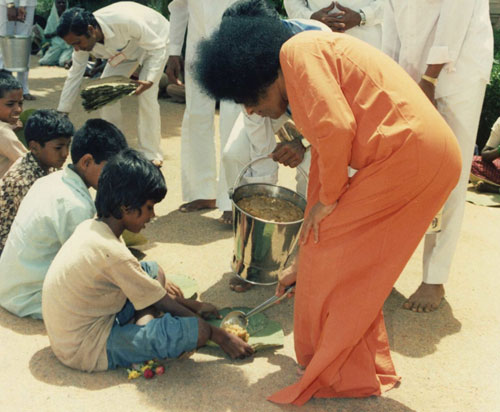
Man is born in the society. He lives in the society. He
grows affluent by serving the society. Under these
circumstances, if man becomes distant from society, he will
be distant from everything.
- Sri Sathya Sai
Divine Discourse, 27 May 1973
Albert Einstein, calling this feeling of separation from each other a delusion, has remarked, “A human being is
part of the whole that we call the universe, a part limited in time and space. He experiences himself,
his thoughts and feelings as something separate from the rest—a kind of optical delusion of his
consciousness. This delusion is a kind of prison for us, restricting us to our personal desires and to
affection for a few persons nearest to us. Our task must be to free ourselves from this prison by
widening our circle of compassion to embrace all living creatures, and
the whole of Nature in its beauty… We shall require a substantially
new manner of thinking if mankind is to survive.”
Swami Vivekananda, the great spiritual leader, emphatically questioned, “Does not our Vedanta also teach us to see all with an equal
eye? Why then do you cherish the idea that the wife and children are your own, more than
others?, when at your very threshold, ‘Narayana’ Himself, in the form of a poor beggar, is
dying of starvation! Instead of giving him anything, would you only satisfy the appetite of
your wife and children with delicacies?”

A wealthy man has been able to acquire riches only with the help of others. Realising this, he has a duty to extend help to others in need
- Sri Sathya Sai
Divine Discourse, 21 November 1986
What Do the Major Religions Say?
Sharing food with the hungry and the needy has been given the foremost place and is considered an inviolable
discipline in almost all religions. It is one of the main indisputable common aspects, of all paths, and why not be, as
every religion recognises service to fellow man in need as the most fundamental duty of everyone.

- “Refuse not food to those who are hungry. When you feed the hungry you serve God, from who is born every living creature”. – Taittriye Upanishad
- “The food of that person who does not share it with others is a waste indeed. I truly say this, that his food becomes his death, not his life. A miser neither feeds the hungry guest, nor does he offer food to God. Eating for himself alone, he becomes a consumer of sin alone!” – Rig Veda : Mandal 10, Sukta 117, Mantra 2 and 6
- “There is no greater punya than truth, no greater happiness than contentment and no greater Daan than Anna Daan.” – Bhavishya Purana
- “A person, who gives food, gives all that is worth giving in this world.” – Varaha Purana

- “And (ask) of the Sinners: What led you into Hell Fire? They will say: “We were not
of those who prayed; Nor were we of those who fed the indigent”
– Holy Quran, Surah 74 : Al Mudaththir, Verse 41-44 - In Surah Fajr, Quran lashes out at those who do not feed the hungry despite the
fact that God has provided them with all the luxuries of life – ““Nor do ye
encourage one another to feed the poor!”
– Holy Quran, Surah 89 : Al Fajr, Verse 18 - (The righteous are those) who feed the poor, the orphan and the captive for the
love of God, saying: ‘We feed you for the sake of God Alone; we seek from you
neither reward nor thanks.
– Holy Quran, Surah 76 : Al Insan, Verse 8-9 - O son of Adam, I asked you for food and you fed Me not. He will say: O Lord, and
how should I feed You when You are the Lord of the worlds? He will say: Did you
not know that My servant So-and-so asked you for food and you fed him not?
Did you not know that had you fed him you would surely have found that (the
reward for doing so) with Me?
– Hadith Qudsi – 18

- “Share your food with the hungry and give shelter to the homeless. Give clothes to those who need them, and do not hide from relatives who need your help.” – Holy Bible, Book of Isaiah 58:7
- “If you give some of your own food to those who are hungry and to satisfy the needs of those who are humble, then your light will rise in the dark, and your darkness will become as bright as the noonday sun.” – Holy Bible, Book of Isaiah 58:10
- “If your enemy hungers, give him food to eat; and if he thirsts, give him water to drink.” – Holy Bible, Book of Proverbs 25:21

Monks, if beings knew, as I know, the results of giving & sharing, they would not eat without having given, nor would the stain of selfishness overcome their minds. Even if it were their last bite, their last mouthful, they would not eat without having shared, if there were someone to receive their gift. But because beings do not know, as I know, the results of giving & sharing, they eat without having given. The stain of selfishness overcomes their minds.
– Itivuttaka 26
Feeding the Hungry – Essence and Attitude
Traditionally, our culture has placed the act of serving food to the needy and hungry on the highest pedestal,
when it comes to noble deeds. Our history is full of anecdotes where people have regarded a hungry person as the
very embodiment of God waiting to be fed! There are stories of how people would not partake of their meals unless
they have first fed a hungry or needy person, on a daily basis. Gifting food to the hungry has always been considered
equivalent to serving and worshipping the Lord himself.
However, along with the act of gifting food and serving the hungry, the essence, attitude and approach are
equally important. No doubt, this noble gesture cannot manifest itself unless there is a spring of love and
compassion within our hearts that flows out to empathise with the needy in the form of service. However, to sustain
this gesture, certain important qualitative aspects need to be kept alive, always.

How Often Should We Serve?
Many a time, we have noticed that people organise
large gatherings once in a while during some festivals or
on some other occasions. Hundreds and thousands are
fed sumptuous meals. Does this qualify or is it enough?
Such kinds of ‘Camps’ can only be called ‘convenience-based service’ (where our convenience or the occasion
becomes more important) rather than being qualified as
‘need-based service’ where the need of the recipient
reigns over any other factor. The important question to
answer here is – do we eat only once a month or only on
some occasions?
Devotees suggested to me that they should be allowed to organize “poor feeding” on Yugadi. Should this be done
only on one day in a year? You must feed the poor on all
days.
- Sri Sathya Sai
Divine Discourse, 29 March 1998You arrange the feeding, once a year, on the Annual Day of your Unit; but; is that enough? Does it solve the problem? Do they eat but one meal a year? They have to eat, as you do, many times a day. So, let Me ask you: Instead of feeding hundreds one day in the year, let the housewife keep aside every day, when she takes out rice for cooking the food for the family, a handful, saying, "This is for the offering that Swami accepts," and at the end of the week, feed at home three or four hungry people with that 'offered' rice. This is the real Anna-Samidh arpana - "offering food as fuel in the holy fire of hunger.
- Sri Sathya Sai
Divine Discourse, 14 March 1999
Who Are We Serving?
It is quite a common perception that we are ‘serving
the poor’ and often this act is called ‘poor-feeding’. Even
though, not intentionally, we commonly call out for
giving food to the poor. However, if we sincerely try to
understand the real essence of this noble act and go
through our cultural heritage through the annals of
history, we will come to know of the lofty approach and sentiments with which the people of this land have
undertaken this noble deed as a matter of great spiritual endeavour and the basis of their daily ‘sadhana’. Are we
really feeding the poor? On one occasion addressing this thought, Sri Sathya Sai Baba remarked:

“When feeding the poor, the rich people think that they are rendering service to Daridra Narayana. Who is Daridra Narayana ? People think that anyone who is without food, clothing or shelter is a Daridra Narayana. But in rendering service to the poor, people should feel that they are serving the Narayana (the Lord)who dwells in the hearts of the poor. To endow this form (of Daridra Narayana) to the formless Divine and serve men in this way is the means of sanctifying one's actions and redeeming one's life. God will dwell in the hearts of those who are filled with thoughts of consideration for the poor and who are eager to serve them”.
- Sri Sathya Sai
Divine Discourse, 19 November 1990
Thus, we must shun the remotest of thoughts that one is serving the poor. It is indeed the service of the Lord
himself. Moreover, to think that we are gifting or doing charity by giving food to the hungry is nothing but a sense of
‘Ego’ which nullifies the merit behind the act itself and does not yield any spiritual benefit either. Thus, Sri Sathya Sai
Baba set the context right for our own benefit and explained the true essence behind this noble act in the following
words which are taken from one of His Discourses:
Further, towards the revival of the true essence and restabilising the lofty ideal behind this noble deed, Sri Sathya
Sai Baba in one of his discourses stated, “Who is poor and who is rich. He who has much desires is poorest man, he who
is content is richest man. Narayan seva is not poor feeding. When you do such a noble task, will you do it ‘poorly’ that
you call it ‘poor-feeding’? English does not have a proper translation for Narayan Seva which is actually an opportunity
to feed the Lord Himself.
When a hungry nara (human) is served a hearty meal, what is being done is Narayana seva (service to God); for nara is only "a form and a name" projected by my (delusion) on Narayana (God).
- Sri Sathya Sai
Divine Discourse, 21 November 1986
“You are referring to the gift of food as Anna-daana (the charity of food). But, no one has the authority to give in charity what has been given by God or be proud of it or even to feel that he has given something in charity. God gave the rains; God fostered the sapling and God ripened the grain; what right have you to call it yours and give it in charity? It is not daana (charity) that you do; you are only offering gratitude to God; you are sanctifying the grain you have harvested by offering the food prepared out of it to these Narayanas (Gods in human form). Call it Narayana Seva! That will be more correct.”
- Sri Sathya Sai
Divine Discourse, 19 November 1990
Is Giving Away Money Not Sufficient?
At times, we also adopt the practice of giving money
either to the needy or to someone for purchasing food
for the needy. Giving away money is the easiest task. One
who has money, may not mind giving it away for noble
purposes but does this really qualify as a service to the
needy? As our age old dictum says, ‘seva tan, man, aur
dhan se karni chaihye’ (service must be done by
indulging in all ways – body, heart and money.) In this
series, money comes last. What is more important is the
first two – body and heart. We must physically toil and
labour heartily to serve the needy. Money is not as
important as our time. In fact, time is more precious
and that is why many of us give away money instead
of time!
What should be our approach and with what
attitude should we undertake this noble act of feeding
the hungry? Let’s again understand this from yet another extract from the discourse of Sri Sathya Sai Baba:
Money is of no help in developing good qualities. Sacrifice alone can develop noble qualities. It is only in sacrifice, there is real yoga. That is why it is said “thyagenaike amrutatthwamanasu (it is only by sacrifice that man can attain immortality). Today, however, people want bhoga (enjoy material comforts). By such bhoga, only roga (disease) will be contracted. They cannot attain yoga. Hence, you try to attain yoga by thyaga (sacrifice). Only then can you attain eternal joy.
- Sri Sathya Sai,
Divine Discourse, 1 January 2004
“It is quality that God values, not quantity. You may perform narayana seva (feeding the poor) on a large scale, but without purity of heart, you cannot please God. God will be pleased even with a morsel of food offered with sacred feelings. All that you do with purity of heart will find fulfillment.”
- Sri Sathya Sai
Divine Discourse, 19 October 1999
“Give generously, wisely; wipe the tear and assuage the sigh and the groan; that is dharma. Do not simply throw money at the needy; give with respect and reverence', give with grace. Give also with humility.”
- Sri Sathya Sai
Divine Discourse, 1 January 2004
The Gift of Food - the Much-needed Revolution
An introspection in retrospect of what we have read above will certainly bring forth the truth that Man has
essentially given up his basic nature of sharing and caring, sympathising and empathising founded on the principle of
Love! This alienation with his inherent nature, which was embedded in the daily living principles in the past, is at the
bedrock of the current chronic problem that the World is faced with.
If the World has to overcome and triumph over this vicious divide and ensure food security for all on an equitable
basis, Man and essentially speaking, each one of us at an individual level has to contribute to absolve Mankind from
this problem. There is no magic wand that can solve this crisis. What is called for, is our collective as well as individual
effort and that is why Sri Sathya Sai Baba remarked in one of His public discourses way back in 1979:
In light of the perturbing statistics and the situation that we have witnessed, these words from Him are still
relevant even after 40 years! In His discourse on 22nd November 1980, he had even appealed to all the devotees to
take a vow of feeding at least one poor person every day:
Narayana Sevā, which is feeding the hungry with reverence and humility, is the sevā (selfless service) that is urgently needed today.
- Sri Sathya Sai
Divine Discourse, 25 January 1979
In conclusion, this age-old tradition of sharing food with the needy every day and the lofty heritage of this great
land of Bharat needs immediate revival. However, unless each one of us takes a step forward in this direction of
serving food to the needy and hungry wherever we are on a daily basis, change in the situation will be difficult to
achieve. What is needed is transforming this practice into a mass revolution that can create a ripple effect of inspiring
our neighbours, associates and everyone around us.
Let us bring back our ethos to life and embark on this noble path of eradicating the problem of hunger from our
planet. Let us see our Lord, be it Rama, Krishna, Durga, Kali, Ishwar, Allah, Jesus, Buddha, in every hungry person and
grab the privilege of worshipping Him by serving food.

“There is one last thing that I should like to impress on you at this Conference. There are in our country numerous poor,' helpless and diseased persons who suffer from hunger and thirst. There are to-day lakhs of members of Sathya Sai Organisations and even a larger number of Sathya Sai devotees. Let each member while leaving this conference resolve to feed at least one poor person every day."
- Sri Sathya Sai
Divine Discourse, 21 November 1980

“The gift of food is the noblest of all gifts
…And, the best type of seva is feeding the hungry.”
…And, the best type of seva is feeding the hungry.”
– Sri Sathya Sai
Divine Discourse, 28 January 1975



